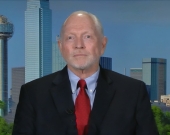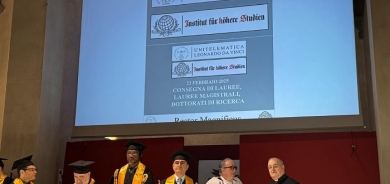Dr. Emran El-Badawi to Gulan: History has proven how demand and supply for oil/gas cause catastrophic wars as we are seeing today in Ukraine

Dr. Emran El-Badawi is program director and associate professor of Middle Eastern Studies at the University of Houston. He founded the Arab Studies program at UH and he has designed, implemented and assessed degree programs in the Humanities and Sciences. These include degrees in Arab-Middle East Studies, Religious Studies and interdisciplinary studies in Energy, Development and Sustainability, with a focus on US-Middle East relations. El-Badawi has consulted for various industries, including government, law and oil & gas. He is also active in program development and fund raising.
El-Badawi also served as founding executive director and treasurer of the International Qur'anic Studies Association, which is the world's first learned society of its kind. Part of IQSA’s goal is to bridge the divide between scholars in the west and those in Muslim majority countries through international conferences. In an interview he answered our questions as the following:
Gulan: In your perspective the Russian decision to invade Ukraine was primarily driven by what?
Dr. Emran El-Badawi: It is complicated. On one the one hand there is no justification for the killing and carnage Russia has unleashed upon the people of Ukraine, invading and possibly annexing Ukrainian territory, and destabilizing European security and energy markets, as well as the global economy. On the other hand, the US insistence to expand NATO—the organization in large part tasked with containing Russia (and former Soviet Union) --was inevitably going to lead to conflict when it reached Russia doorstep, as it has now. NATO expansion came to fruition in waves after World War II, culminating in the Bucharest Summit of 2008, where the US announced it would add Ukraine and Georgia (Russia's doorstep) to NATO. The Russian's protested vehemently, leading up to the 2014 war and annexation of the Crimea, and the 2022 war. In other here is a very long history to the current conflict, which I argue the US made inevitable.
Gulan: What does the Russia- Ukraine war tell us about the great power politics? Have we ushered into another cold war?
Dr. Emran El-Badawi: Today the term "Cold War" is largely a euphemism that is part of the western imagination and identity formation. It is a term for Euro-Americans united by economic and political interests to differentiate themselves from Russia, behind which they actually have an intimate shared history.
Proxy wars between the US and Russia/Soviet Union never stopped and have actually intensifies in recent decades, including Syria (2011-Present), Iraq (2003-2011), Afghanistan (1979-1989). This is to say nothing about bloody rebellions, insurgencies and conflicts throughout Asia, Africa and Central America where in both powers were complicit. We are only in a new "Cold War" in so far as Europeans and Americans imagine themselves involved in it. The reality is that perpetual war between great powers has caused the war between Russian and Ukraine. And the prospect of nuclear conflict and more widespread global conflict are very real, and frightening.
Gulan: Can we say that this war has been another nail on the coffin of the what has been called rules-based order?
Dr. Emran El-Badawi: I am skeptical of ideas like "rules-based order," "liberal international order," or several other such political theories, because they reflect are biased and do not sufficiently reflect the necessity of war and domination to the international order. The related concept of the "invisible hand of the market/economy" is equally false, because—for example—in order for large multinational corporations to make huge profits selling goods and services around the world (cars, oil, energy, microchips, food, etc.), it is necessary to repress native populations, and totally dominate sea and land routes (e.g., Persian Gulf, S. China Sea, Black Sea) violating or emending international laws in the process.
Whatever current order will continue, but simply be renegotiated. The Germans will have to negotiate between the US and Russia for energy. The French will increase nuclear energy productivity to free themselves of US and Russian reliance. Eastern European nations may drift closer to either power, with Belarus clinging to Russia and Ukraine fighting for its life in the West. And so on. With ongoing sanctions Russia may grow isolated globally, and become more volatile. Meanwhile the wars and conflict that keep the current order in place continue.
Gulan: In your opinion where this war is heading, do you expect a further and wider escalation of this war? Or you expect that some negotiated settlement would be possible?
Dr. Emran El-Badawi: Please see above about escalation. There is zero settlement in sight. The two nations have built their entire foreign policy on a zero-sum game, as far as NATO is concerned. One party will need to concede or compromise for there to be a settlement: either Russia allows Ukraine to enter NATO (impossible!) or the US removes plans to add Ukraine to NATO (more impossible than before).
One possible outcome of the ongoing conflict is that Russia annexes the border regions of Ukraine with strong Russian support, esp. the Donbas region, including Donetsk and Luhansk, and the borders of Ukraine will be redrawn. Again, this is assuming a wider conflict is avoided.
Gulan: How do you assess the effectiveness of the western’s reaction to the Russian invasion, especially the rapid and sweeping sanctions against Russia?
Dr. Emran El-Badawi: US sanctions have destroyed the Russian economy, and may starve Russian people and businesses. But its effectiveness after six months of bloodshed is debatable. Meanwhile there are no signs president Putin and his military inner circle are changing course.
At the same time US sanctions have been accompanied by enormous arms shipments to Ukraine and other European countries; and the bloodshed has been thus far contained to Ukraine and Russia. And NATO expansion has intensified, with Finland and Sweden joining in fear of Russian aggression. This development has certainly been good for the US and EU.
Gulan: To what extent has this war changed or shifted the European’s calculation in terms of energy and military security? What would be the implication of this shift on the future of this continent?
Dr. Emran El-Badawi: Please see above. I will add: It is not a coincidence Germany is the world's leader in solar energy. Its problem is also relying on Russian gas, which it is now actively looking to move away from. Similarly, France is a world leader in nuclear energy, which has stabilized its energy market significantly. Other European nations will follow these leaders.
The reality is that alternative/transitional energy sources are both spreading and becoming more necessary with each passing conflict. History has proven how demand and supply for oil/gas cause catastrophic wars as we are seeing today in Ukraine. I have written about the "oil curse" elsewhere. The coming years will bring more nuclear, solar and wind energy. The question is, until the day when energy sustainability and self-sufficiency become a reality for Europe, can the US and by extension NATO control the violence necessary to police and maintain today's energy markets?
Gulan: Has this war had any implications on the Middle East or it is essentially irrelevant?
Dr. Emran El-Badawi: Please see above. I will add: The strategic location of the Middle East and North Africa, and its remaining oil/gas fields, make it a "honey pot" for both the US and Russia. The ongoing conflicts in northern Syria, parts of Yemen and other regions are part of the picture. Nations in the MENA region are also very much divided between the powers' sphere of influence















